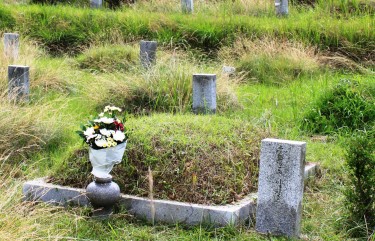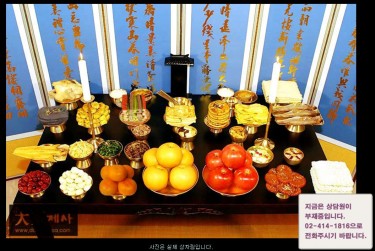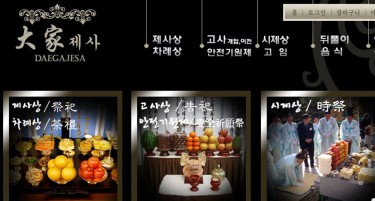As the nation’s biggest holiday ‘Chuseok’ — the Korean version of Thanksgiving day — approaches, families have already started feuding over the holiday preparations. The universal clash between family members during the holidays has intensified in Korea. This issue: the ancestral worship and the tomb maintenance. Severe arguments have broken out between family members over who is responsible for managing the state of family tombs and whether they will forgive Christian members of the family that are absent from ancestral worship ceremonies.
Clash 1: Who will maintain the tomb?
It is usually the oldest son of the household who is expected to visit ancestors’ burial mounds to trim plants, pluck twigs and clean the area surrounding the grave site. In reality, however, it is the one who loses the power struggle or is too kind to pass the responsibility onto others. The tomb maintenance is not as easy as it sounds. It takes almost an entire day to clean three or four tombs of immediate ancestors and several days to clean more than ten to 20 tombs of extended families. The tombs are often located several hours drive from the city and for white collar workers who have no experience in agricultural labor, it can take several hours to become familiar with a weeding machine. In many cases, bee hives are hidden around the tombs resulting in several sting-related deaths nation-wide during tomb cleaning season.
An image of a burial mound.
Complaints about family member’s evasion from the grave site responsibilities have started mounting on open discussion sites during the last week. Several tens of thousands have read the articles and immediately below thousands have actively responded, sharing the same stress and giving tips on how to deal with irresponsible siblings. Netizen ID: Cricket, [2]the wife of a youngest son of the family, wrote in her first few sentences that while her husband went to bed early for the following day's grave site cleanup that starts early in the morning, she is too angry to sleep. Her husband, she says, is too gentle to argue with his older brothers who take advantage his good nature.
이제 추석이 다가오니 벌초를 해야 하는데, 매년 똑같다. 울 남편이 거의 혼자 벌초를 다 한다. 20개가 넘는 묘를 이틀 동안…몇 해전부터 남편이 혼자 하길래 너무 성질이 나서 화를 다 내도 남편은 그냥 냅 두랜다…뒤에서 지켜보는 시어머니 더 밉다. 큰아들이 허리 아프다니 어떻 하냐 시면서 오히려 나에게 슬쩍 하소연 하신다..작년에는 벌초하는 날 허리 아프다더니 낚시간 거 가 뽀록났는데.
A reply was posted immediately by netizen ID: Sanggong [3]whose article starts out ‘I totally understand your situation as a person who once had trimmed his uncle-in-law's tombs’. He said that he and his brother have trimmed ten tombs and suggested to ID: Cricket that she persuade her mother-in-law to gather money to hire several people from a professional tomb-trimming service. This new tomb-trimming business has taken off in Korea recently due to huge demands. A tomb-trimming company, after receiving orders and the tomb's locations online, sends staff to the site and later posts pictures of the clean burial mounds on the company web site.
ID: Sanggong later blamed both his own and his wife’s families on their irresponsible behavior. He said that while rich celebrities and successful business men of his family refused to chip in to cover the trimming cost, his wife’s brother and sister always evade the trimming duty, saying they are Christians.
Clash 2: Religious Belief VS Family Conformity
Even though Christian sects make up over 30 percent of the Korean population, Christians are still minority in family power dynamics. Churches claim that the practice of ancestral worship is a form of idol worship and ban its members from worshiping at the tombs or in front of the indoor ancestral shrine, or from eating food served at the ceremony. This ban has unintentionally turned the nation’s biggest holidays — the Lunar New Year’s day and the Chuseok — into religious battlefields. Christian members often refuse to bow down in front of the ancestral shrine while other family members urge them to follow the tradition for the sake of family conformity. They pressure Christian family members because the act of bowing down, especially to their own deceased parents or ancestors, is not an issue for them and is even encouraged. This leads to many Christians feeling that they are being persecuted. Blogger Chanjkim [4]who introduced himself as a Christian scientist, shared his own story of the argument he had with his mother.
제사상 앞에서 우두커니 서 있는 나 자신의 모습이 어머니에게는 불성실하다고
느껴졌을 것이다. 어느 날 어머니 앞에서 제사를 드리지 않겠다고 했다. 형제들은 종교의 자유를 인정한다며 그렇게 하라고 했지만 어머니는 가족의 화합을 깨는 행위라면 받아 드리지 않았다.
나는 여전히 어머니의 고집을 꺽지 못했다.
Blooger Kimfrancois criticized [5]the Christian practice of prohibiting people from worshiping their own ancestors as ‘weird’ and expressed his worries on the extinction of a beautiful tradition.
벌초를 하고 성묘를 하는 것은 자기가 태어난 곳, 우리를 이 세상에 나오게 해주신 조상님들께 해드리는 최소한의 예절인데 일부 종교에서 우상숭배라고 하여 이를 우습게 아는 이상한 풍습이 만연되는 것은 참으로 안타까운 일이라 하겠습니다.
Clash 3 : Tradition vs Convenience
Even for the most strict followers of Confucian traditions, the labors required for the complicated sets of rituals are difficult. To save significant amounts of time and energy on the ceremony, many new businesses related to the rituals were created and now thrive in Korea. There are the tomb trimming agencies, catering services for the ritual foods, the leasing of shrine equipment, and professional commentators for rituasl. These businesses are, of course, not in line with the true spirit of with ancestor worship.
Images from The Deaga Jesa, an online ritual food catering company. [8]
The blogger Chanjkim cited in the previous paragraph commented that even though his religion does not approve of ancestral worship, it is lamentable to watch the ritual downgraded into cempty and soulless formalities.
스키장에 간 가족에게 대신 제사상 차려 준다는 괴이한 뉴스가 오래 전에 있었다. 믿음을 갖고 생활하는 나이지만 이런 뉴스를 접하면서 드는 생각은 괘씸하다는 것이었다…그리고 추석과 설만 되면 비슷한 뉴스가 있어왔다. 제례에 사용되는 전이나 부침이를 대신 만들어 주는 사업이 번창한다는 것이다…정성과 마음이 빠져있는 조상에 대한 예의, 스키장에서의 제사상 대행업, 제례음식의 상업화, 이런 것들로 미루어 보아 제사 풍습은 그리 오래지 않아 사라질 것으로 예상된다.
It is probably neither the old Confucianism nor the Christianity, but the Capitalist system in which Koreans live that is to blame. The big holiday of Chuseok is just around the corner (from September 21 to 23). The family reunion may be delightful but no one welcomes the stress they bring along.


